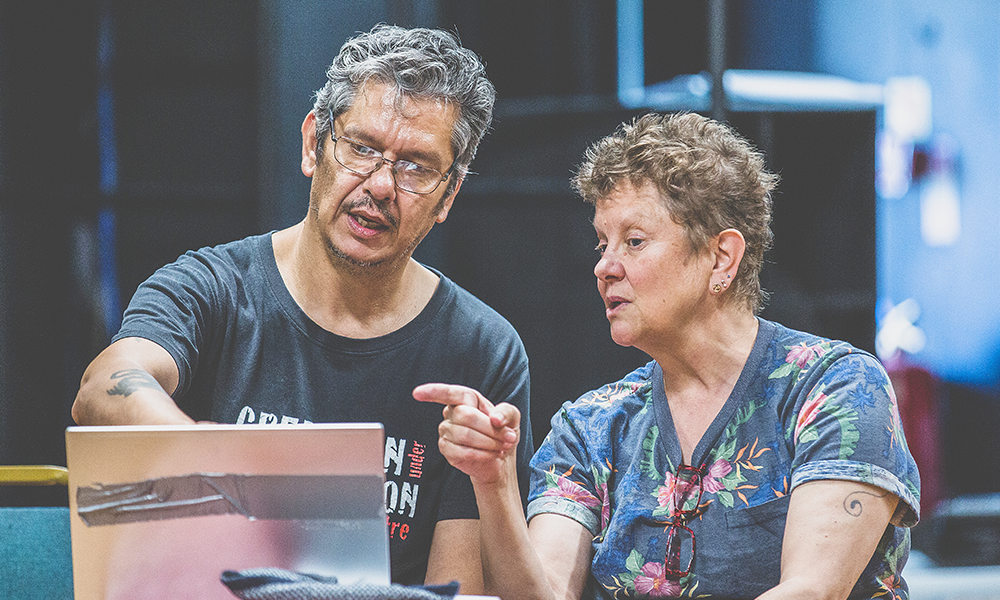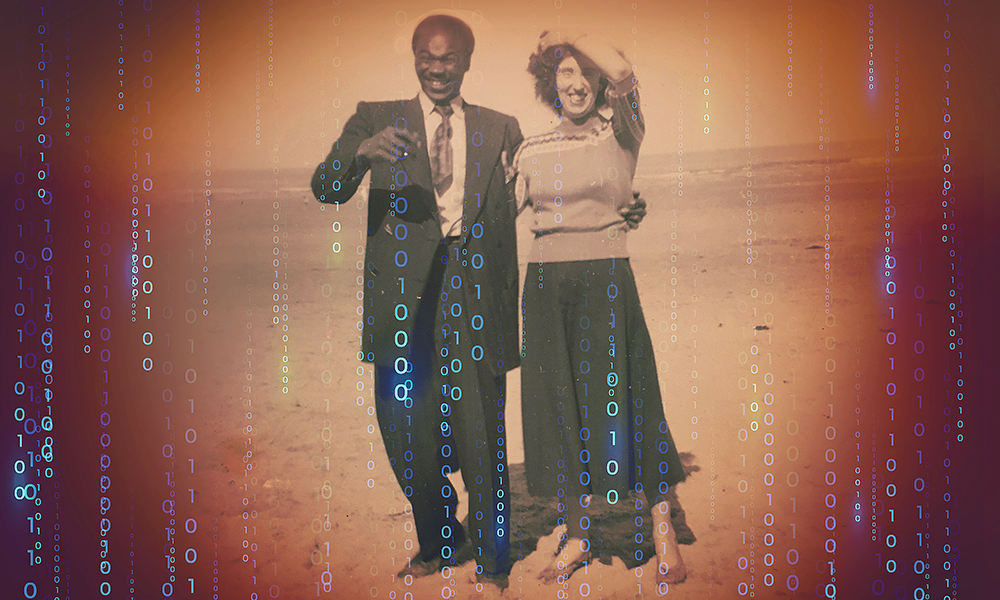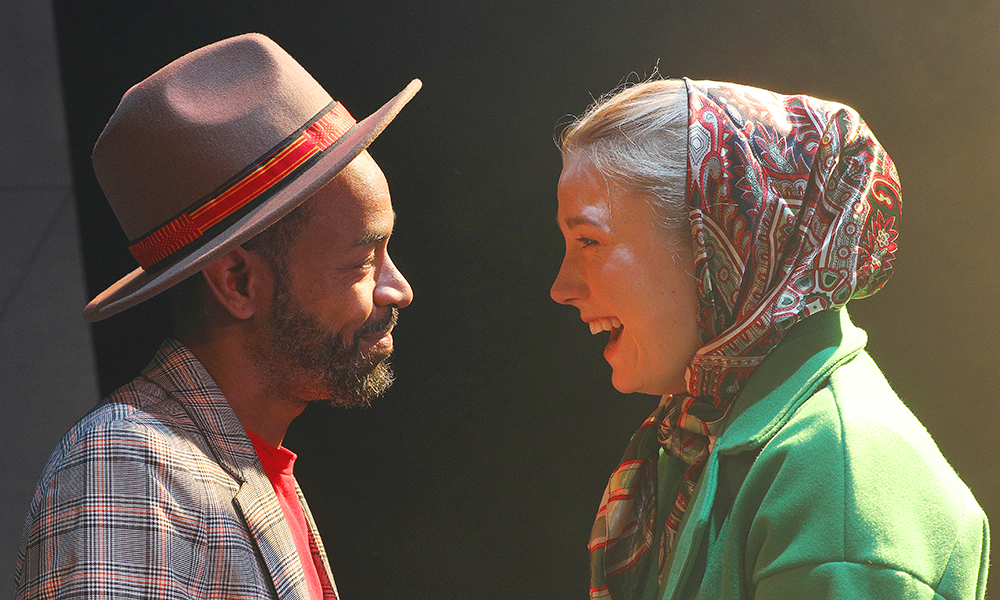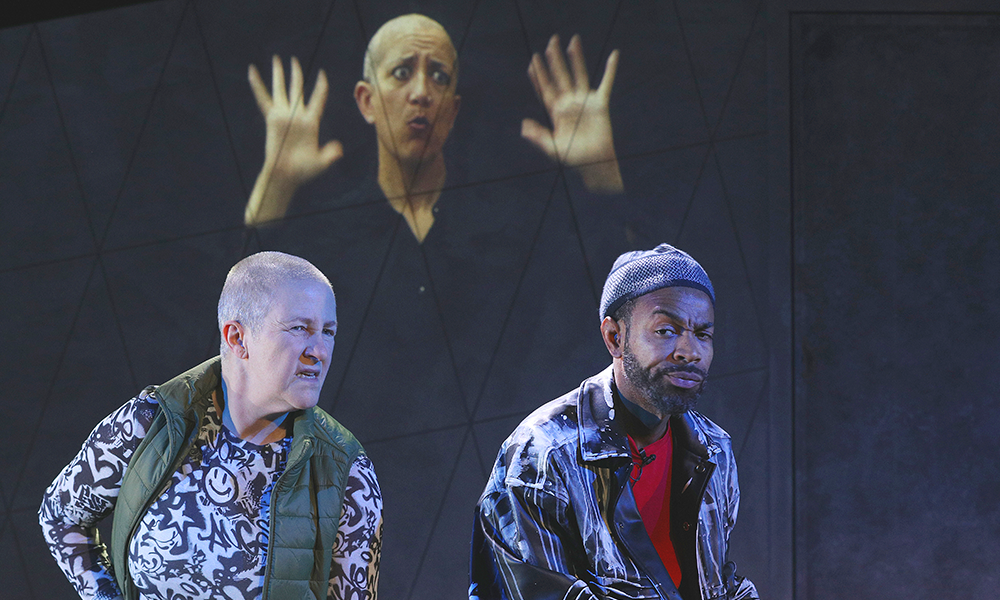The new play’s co-writer and co-director, Julie McNamara, on highlighting stories of abuse

Subscribe to Wharf Life’s weekly newsletter here
BY LAURA ENFIELD
“We really have to push back now because we’re living so close to a dystopian future.”
These are scary words from Julie McNamara, but ones that ring true when you consider the Nationality And Borders Bill passed into law in April.
“It allows the Government to strip individuals of their British citizenship without warning or reason. And no-one seems to be talking about it.
“It’s shocking what’s happening in this country right now,” said Julie, who has co-written and co-directed play Quiet Rebels with the aim of exposing ingrained racism in our society.
“It’s set to run at The Albany in Deptford from November 9-11, 2022.
“I can’t believe while we were picking the navel fluff from our bellies, they put something in law about revoking your UK citizenship for any reason and there is no recourse to appeal,” she said.
“How is this happening in our lifetime – and how are we not revolting?”
Quiet Rebels was inspired by her own family’s traumatic experience with the Home Office, which tried to deport her nephew back to Jamaica after two decades.
“It was the hardest time for us as a family,” said the 62-year-old. “Troy has been with us for 21 years, with my niece all that time, and they have four children.
“We had to prove they were in an enduring relationship several times over in four different cases and also that it would be unduly harsh for the children to have their father removed to Jamaica.
“The shocking and obscene language I heard at court just absolutely blew my mind.
“We spent five years and an awful lot of money fighting like hell. We finally won on October 28, 2020, in the Royal Courts Of Justice.”

Their battle was the catalyst for a project with Hassan Mahamdallie, an internationally known senior policy maker and writer of The Crows Plucked Your Sinews, a play about the impact of British imperialism on Somalia.
Julie, founder of disability arts company Vital Xposure, based at Hackney Empire, kept being told she should work with him and went to hear him speak about his report for Arts Council England – The Creative Case For Diversity.
“He quoted this beautiful poem by Langston Hughes – Harlem: A Dream Deferred and I knew then he was the kind of thinker I would love to work with,” said the Hackney resident.
They spent four years developing Quiet Rebels, gathering stories from women who had been spat at, verbally abused and hounded just for marrying men of a different race.
That included Julie’s niece Sophie.
“For me, the impetus has been to try and wake audiences up to what is happening around us, right here, right now, in our own courts,” said Julie.
“I wanted to start hearing from white women who fell in love with brown and black men.
“We went back to the Windrush years and said: ‘Is this where it began?’.
“We know black communities have been established in these islands for a long time, but you go back and think: ‘Alright, where has this nonsense come from?
“When did the racism really set in and why are we going back to a rising right?’.
“It’s embedded in British politics, the monarchy and the class system.”

Hassan comes from a mixed heritage family and his mother’s story is at the heart of the play.
“She was a working class secretary and met and fell in love with a young guy who came from Trinidad,” said Julie.
“Her mother was appalled and totally against the relationship.
“One day she put her daughter’s husband’s books out in the garden and burned them, which I think is such a fascist statement.”
They also spoke to a woman who was hounded out of Hull after raising her mixed heritage children there.
“She said this is the most racist country she’s ever lived in and she has lived in rural France, Greece and South Africa,” said Julie.
“She talked about the violence that she had received on the streets, the terrible fear she had for her children. In the end, she was so frightened that she left and went to Australia.
“There are common themes that run through all their stories about the racism they experienced, being spat at on the streets, called n-lover, whore, slag.”
The Albany co-produced and staged an early version of the play in development in 2019 and the duo knew they were onto something.
“That show was only about 35 minutes long but the Q&A went on for over an hour and a half and in the end we got chucked out,” said Julie.
“It revealed a great appetite for this work, for the stories we’ve touched on.
“One of the very common comments was it was refreshing to have white perspectives on the Windrush stories because there’s been so much black trauma staged repeatedly in British theatres and we’ve seen so much spilling out on our screens that it’s actually hugely wounding.
“It’s one of the reasons that we have so many young black people overpopulating prisons and mental health systems – because of the pain and the violence of systemic racism.
“It’s getting worse and permissions, it seems to me, have been given since Brexit, so people are becoming more hostile.”

Julie said the white women who married men of a different colour were part of the cornerstone of building the multicultural societies we have today.
“It’s because of who they were and the love that they had for these men,” she said.
“We met some amazing people and some ordinary people and one of the things we discovered about each of them was that they were all quiet rebels.
“Perceived as rebels not by us, but by their parents or local communities or peer group.
“The only crime was they fell in love. Is that a crime?”
Today’s version of the play takes the stories of four women – Margaret Chapman, Mary Khan, Elizabeth Grogan and Yvonne Ali – and sets them inside a racist future where Conservative MP Enoch Powell, who famously believed someone was only British if they were born here, became prime minister.
Clips of the women speaking open the show and snippets are spoken again by the actors.
The cast is made up of mixed heritage actors Joe Conteh and Deni Francis, Pickles ‘Wayne’ Norman, Lottie Bell, an actor with a hidden disability, and Fiona Whitelaw, who shared her experiences of being a “white pariah”.
Her husband worked as a black detective in the Metropolitan Police and his experiences of racism helped inform the character of the detective.
Fiona leads the audience around the world, narrating what she can see as a form of integrated audio description.
The play also contains pre-recorded sign language and creative captioning is at the heart of its design.
“I didn’t want traditional audio description with people set apart with headsets on,” said Julie.
“That annoys the hell out of me, because I feel like that’s a new kind of apartheid line.”
The plot follows an investigation into the murder of a white women who married a black man.
As a convicted race-traitor with four children, she has served time for miscegenation.
“It’s set in 2028, but the language you hear has come out of the mouths of politicians from this country in the last few years and from the Royal Courts Of Justice,” said Julie.
“Some people have complained about it, and quite right too, but we stand by it because I think it needs hearing. I feel this is a really important piece of work.”
Julie is appalled some of the “nonsense” they came up with for the play is now coming true.
“When we began writing this, we thought it was so dystopian – but we’re already living it, we have caught up with it,” she said.
“In this country, we didn’t have miscegenation laws, but the president of Hungary was saying recently: ‘We are not a nation if we are mixed’.”
Julie said events surrounding the Queen’s death also reflected issues in the play.
“We’ve been shut down and we’re not allowed to peacefully protest – somebody was arrested for saying: ‘Who elected him?’ at a proclamation for the King,” she said.
“Why we’ve got the monarchy now, I do not know. It’s so out of date.
“You look at it and think: ‘Wow, your own son and his mixed heritage wife have had to leave this country because they feel so uncomfortable about the racism inside the monarchy’. Isn’t that a statement in itself?
“One minute we were watching this extraordinary wedding that gave a sense of hope and then it all unravelled in front of us.”
Quiet Rebels is also based on stories of love tinged by hate but Julie said the aim was to use them to open up conversations between families, friends, generations and communities about their experiences of racism.
“Some people come to the play hoping it’s going to be a story of romance and love and undoubtedly love is at the heart of the show,” she said.
“But there’s an awful lot we have to fight through and it’s about waking audiences up to the rise of this structural racism in England, which is bleak and needs dismantling.”
Transcripts of the interviews and from the court case will form part of an information pack they are building to go alongside the play.
Julie said she wanted the conversation to continue even after the run ended.
“The play has an open end – you’re left with questions,” she said.
“But it does end with a more positive moment as nobody would want to leave it like this – so what happens next?”
Read more: Discover east London firefighter Stephen Dudeney’s book
Read Wharf Life’s e-edition here
Subscribe to Wharf Life’s weekly newsletter here
- Laura Enfield is a regular contributor to Wharf Life, writing about a wide range of subjects across Docklands and east London



